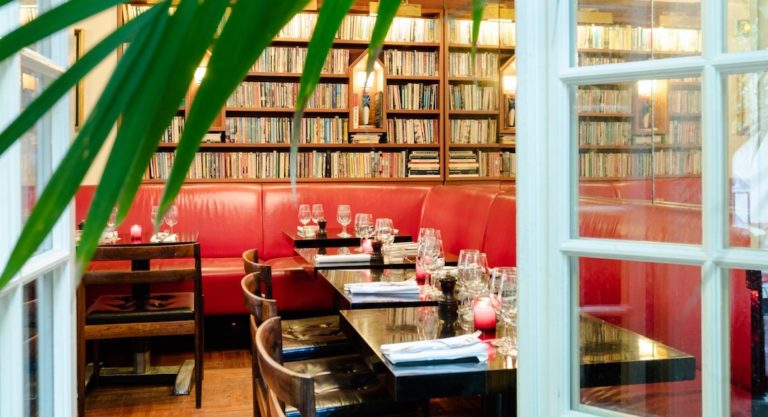Language tourist – (n.) someone who speaks a version of a foreign language that is outdated, overly formal, or just not how native speakers sound.
A foreigner and a native can be in a city but not quite live the same way — not going to the same cafés, not buying the same groceries — because one is a tourist and the other a native. The same can happen with a language. You can speak French, but because you didn’t grow up saturated in the language, you just sound a little off.
To help you sound less like a language tourist and more like a native speaker, Frenchly is lending you its native speakers. Here are 11 words commonly spoken by the French people in our offices shared with French Morning.
1. Arrête ton cinéma
Really this little phrase is a command, perfect for telling someone to knock it off with their crocodile tears and drama. “Arrête ton cinéma” [ahrett tohn sin-ay-ma] means “stop your movie,” as in “stop acting so dramatic.” (“Arrête” comes from the verb “arrêter.”) Next time your cousin is throwing a tantrum to get what she wants, tell her “arrête ton cinéma.”
2. Accro (à quelque chose)
“Accro (à quelque chose)” [ah-crow ah kel-kuh shows] means “to be obsessed (with something).” When you get asked what you’ve been watching on Hulu lately, you can say, “je suis accro à Broad City.”
3. Une pause clope
A uniquely French phenomenon, “une pause clope” [oon pose clope] is a break to smoke a cigarette. If your friend Laure wants to go out for a cigarette with your friend Benjamin, she asks him, “Pause clope?” If someone asks you where Laure and Benjamin are, you say, “ils sont en pause clope.”
4. Prendre un tacos
No, you aren’t going out for tacos (unfortunately). “Prendre un tacos” [prahndr uhn taco / ta-cose (it can be pronounced either way)] means “to take a taxi.”
5. Bouffer comme quinze
“Bouffer comme quinze” [boo-fay cohm kahnz] literally translates to “eat like fifteen” and it means just that. At Thanksgiving, after you’ve had second helpings of turkey, stuffing, cranberry sauce, mashed potatoes, green beans, rolls, pecan and pumpkin pie, when you’re stuffed and sitting with your pants unbuttoned, say “j’ai bouffé comme quinze.”
6. Paumer (quelque chose)
“Paumer” [poh-may] is the same as “perdre” [pair-druh] in that both verbs mean “to lose,” both in the sense you don’t know where something is and in the sense that you didn’t win something. The difference is that “paumer” is more casual, and should be used with family, friends, and coworkers. “J’ai paumé mes lunettes de soleil à la plage.”
7. T’as du feu?
You’ll hear this question a lot near bars and at parties: “t’as du feu?” [tah doo feuh]. It means “do you have a lighter?” because French people smoke a lot, but they apparently don’t all carry a lighter.
8. À toute / À plus
Both of these exclamations are made as you leave a place, but they aren’t the same. “À toute” [ah toot] basically means “see you soon,” and you use it when you know the next time you’ll see someone. “À plus” [ah ploose] basically means “see you later,” and you use it when you aren’t sure about the next time you’ll see someone.
9. Être calé(e) sur quelque chose
“Être calé(e) sur quelque chose” [etruh kal-lay sur kel-kuh shows] means to know something well or to be ready. Got a presentation to give in an hour? “Je suis calé sur la présentation.” Does your friend know everything about France’s soccer team? “Il est calé sur les Bleus.” The thing to remember is that this a casual thing to say. If you want to say this to your boss, you should say “au point sur quelque chose” [oh pwah sur kel-kuh shows].
10. Se marrer
“Se marrer” [suh mah-ray] is a reflexive verb means to laugh a lot. So when you get asked how it was to see Gad Elmaleh live at the Comedy Cellar, “on s’est marré.”
11. [Insert something here], quoi
One of the most French things ever, you add “quoi” [kwah] onto the end of a word or phrase to essentially tell someone “obviously” or “you idiot.” Let’s say an American orders a croissant at bakery and he says, “can I have a krussahnt please?” with a very American pronunciation of “croissant.” If there are two French people in line behind him, one might turn to the other and whisper, “c’est un croissant, quoi,” to basically say “it’s a croissant, you idiot.” Another example: if you have gone to the same bar called Aleo with your coworkers every week for the past year, and someone asks “on prend un verre où ce soir?” (where should we have a drink tonight?) you can say “on va à Aleo, quoi” (to Aleo, obviously).
Want to learn more French words straight from the mouths of native speakers? Check out our lists of words to know from February, March, April, May, June, July, August, September, and October.






